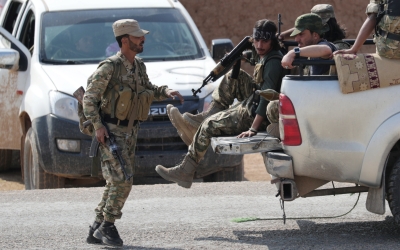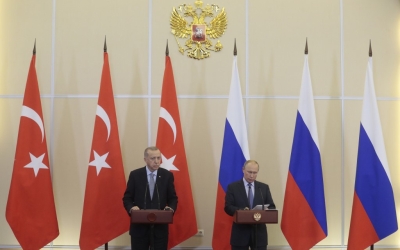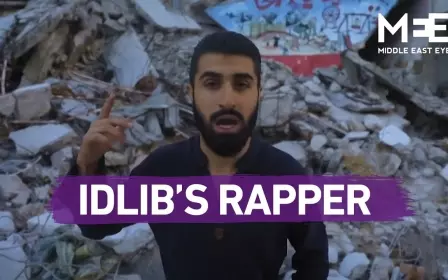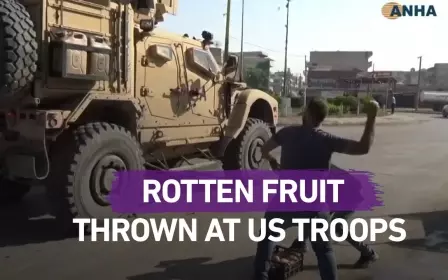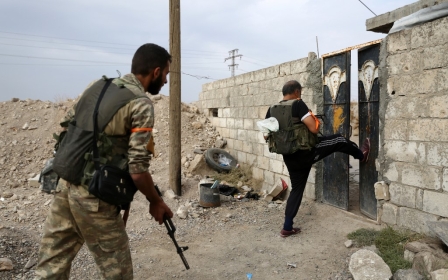Trump lifts sanctions on Turkey, hails Syria ceasefire
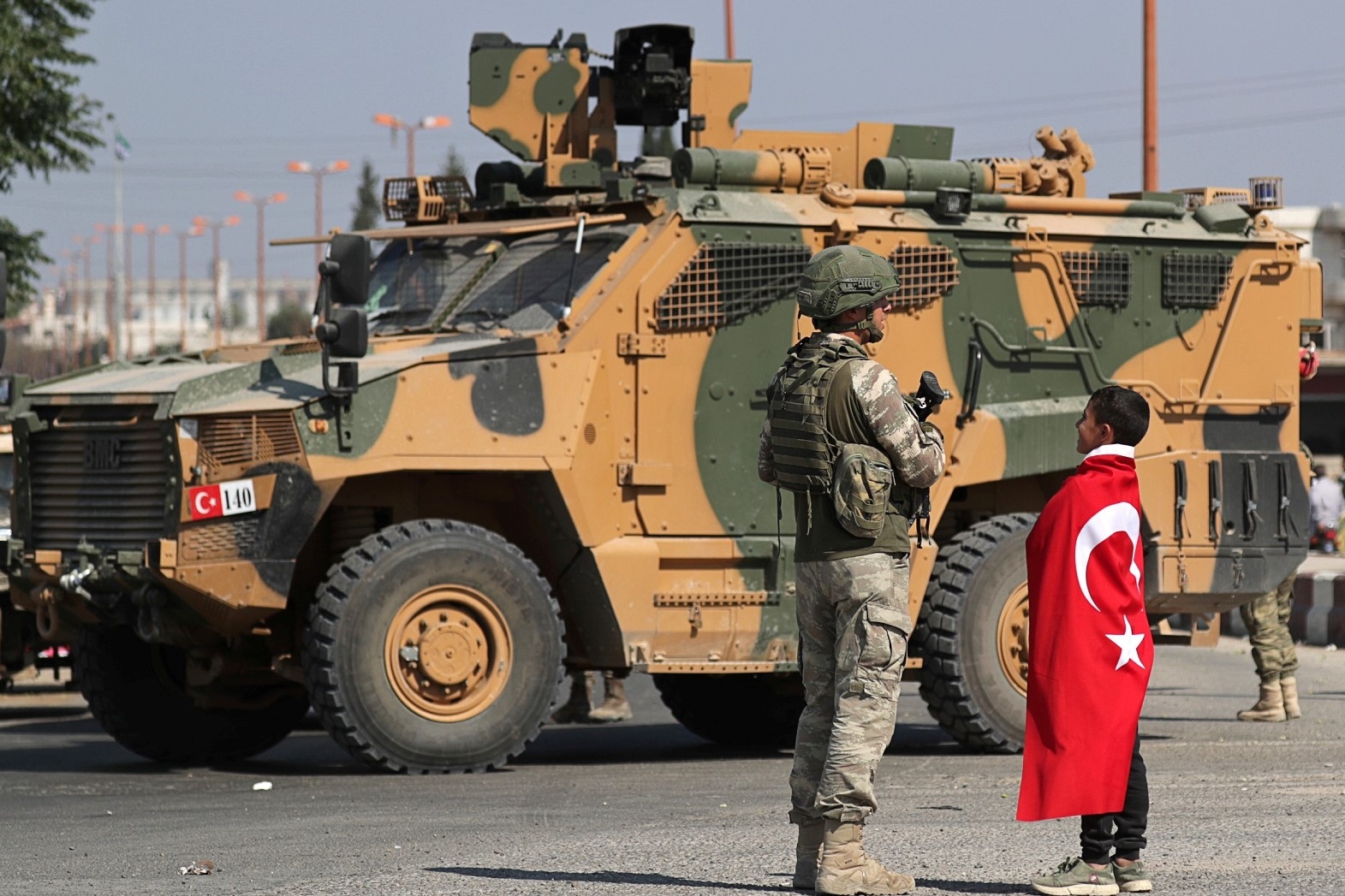
The United States will lift sanctions it imposed on Turkey over the country's military offensive in northern Syria, Donald Trump has said, hailing a ceasefire agreement that halted the Turkish incursion and pushed Kurdish fighters out of the border area.
Speaking from the White House on Wednesday, Trump said only a small number of US troops will remain in the areas of Syria "where they have the oil" - an apparent reference to oilfields in the country's northeast.
"Let someone else fight over this long blood-stained sand," the US president said.
Trump ordered American soldiers to withdraw from northern Syria earlier this month, paving the way for Turkey to carry out its military campaign against Kurdish fighters there.
However, only days after apparently giving Ankara the greenlight for the offensive, the US administration imposed sanctions on Turkey over the incursion.
New MEE newsletter: Jerusalem Dispatch
Sign up to get the latest insights and analysis on Israel-Palestine, alongside Turkey Unpacked and other MEE newsletters
'Let someone else fight over this long blood-stained sand'
- Donald Trump, US president
On 17 October, eight days after Turkey launched its Peace Spring operation, US Vice President Mike Pence and Turkish President Recep Tayyip Erdogan reached a five-day ceasefire agreement to allow Kurdish fighters to leave areas along the Turkish border, effectively creating a so-called safe zone.
Late on Tuesday - at the end of the five-day period - Turkey said it would not renew its offensive, declaring that Kurdish militants had withdrawn from the area.
Turkey struck a deal with Russia on Tuesday that would cement the ceasefire it signed with the US and ensure that Kurdish fighters withdraw from border areas.
The next day, Reuters reported that Russian military police started to deploy on Syria's northeast border as part of the deal.
"By getting that ceasefire to stick, we've done something that's very, very special," Trump said on Wednesday.
Allegations of war crimes
The fighting had displaced thousands of people and killed dozens of civilians on both sides of the border.
Trump told the Turkish president last week that he imposed sanctions following the killing of a Syrian Kurdish politician by Turkish-backed fighters during the offensive.
As Trump was making his announcement on Wednesday, the US special envoy for Syria, James Jeffrey, raised concerns about "war crimes" committed by Turkey in Syria.
"We haven't seen widespread evidence of ethnic cleansing," Jeffrey told lawmakers in the US House of Representatives, as reported by Reuters news agency.
"Many people fled because they're very concerned about these Turkish-supported Syrian opposition forces, as we are. We've seen several incidents which we consider war crimes."
In his address, Trump said that Washington would reimpose sanctions against Ankara should it fail to protect religious and ethnic minorities.
"Should Turkey fail to honour its obligations, including the protection of religious and ethnic minorities, which I truly believe they will do, we reserve the right to reimpose crippling sanctions, including substantially increased tariffs on steel and all other products coming out of Turkey," he said.
The US-backed, Kurdish-led Syrian Democratic Forces (SDF) has played a major role in the fight against the Islamic State (IS) group.
But Turkey views Syrian-Kurdish fighters on its border as a threat to its national security.
Ankara considers the People's Protection Units (YPG), which is the main faction in the SDF, as an offshoot to the Turkey-based Kurdistan Workers' Party (PKK), a group designated as a terrorist organisation by Turkey and most Western countries.
On Wednesday, a spokesman for top Syrian-Kurdish general Mazloum Kobani thanked Trump for his efforts to end the Turkish offensive, saying that the US administration "promised to maintain [the] partnership with SDF and long-term support at various spheres".
"Thank you General Mazloum for your kind words and courage," Trump wrote in response to the SDF spokesman's tweet.
"Please extend my warmest regards to the Kurdish people. I look forward to seeing you soon."
Republican and Democratic senators on Wednesday called for Mazloum to be quickly issued a visa to the US, so that he could discuss the situation on the ground in Syria.
In a letter sent to US Secretary of State Mike Pompeo, the senators said that hearing from the Kurdish general would benefit both Congress and the Trump administration, Reuters reported.
'Big success'
The White House has faced a bipartisan backlash in Washington for Trump's decision to withdraw American troops from the war-torn country, with critics accusing him of betraying his Kurdish allies there.
Last week, the US House of Representatives overwhelmingly approved a resolution denouncing the pull-out.
Still, the US president stood by his decision despite rebuke from members of his own Republican Party.
On Wednesday, he hailed the outcome of the withdrawal, calling it a "big success".
"Big success on the Turkey/Syria Border. Safe Zone created! Ceasefire has held and combat missions have ended. Kurds are safe and have worked very nicely with us. Captured ISIS prisoners secured," Trump tweeted earlier in the day, using an alternate acronym for IS.
But the deal has not quelled the criticism in Washington.
Senators from both major parties have said they intend to push ahead with a bill that would impose heavy sanctions on Turkey for the incursion.
On Tuesday, Republican Senate Majority Leader Mitch McConnell also introduced a resolution denouncing the US troop drawdown.
Trump's critics also say the president's decision has opened the door for the Syrian government and its Russian backers to capitalise on the vacuum left by American troops.
Senator Chris Van Hollen, a leading Democrat pushing the sanctions bill against Turkey, condemned the US president's speech on Wednesday.
"Trump's celebration of the Putin-Erdogan deal represents his total surrender of American leadership and the treacherous betrayal of our Syrian Kurdish allies," Van Hollen tweeted. "It is also a recipe for the resurgence of ISIS. Congress must fill the leadership void."
Russian military police entered the Syrian-Kurdish town of Kobane on Wednesday as part of the deal, Reuters reported.
Located right on the Turkish border and east of the Euphrates River, Kobane is of symbolic importance to the Kurds, who maintained control of the town amidst a fierce offensive by IS militants in 2014.
Moscow and Damascus opposed the Kurds' aspirations for self-rule in Syria, while also rejecting the Turkish military offensive.
But on Wednesday, Kremlin spokesman Dmitry Peskov warned Kurdish fighters that Russian troops would not protect them if they did not withdraw from border areas.
"Remaining Kurdish formations would then fall under the weight of the Turkish army," Peskov said, as reported by Reuters.
Middle East Eye delivers independent and unrivalled coverage and analysis of the Middle East, North Africa and beyond. To learn more about republishing this content and the associated fees, please fill out this form. More about MEE can be found here.


